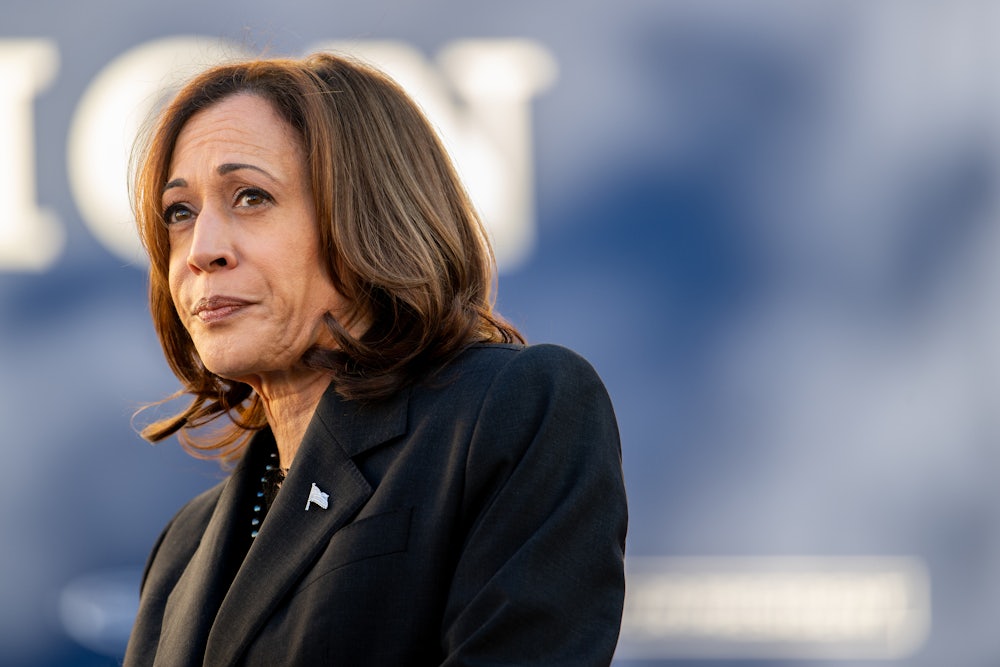“In the modern imagination,” Professor Lewis Gordon wrote in 2023, paraphrasing philosopher Frantz Fanon, “reason takes flight whenever the Black enters the scene.” Indeed, from the moment the Democratic Party coalesced around Vice President Kamala Harris as its nominee, ushering in the prospect of America’s first Black Madam President, reason has taken flight.
“Apparently, they feel, or a lot of Democrats feel, they have to stick with her because of her ethnic background,” Republican Representative Glenn Grothman said on the day President Biden ended his reelection campaign. Two of his House GOP colleagues, Tim Burchett and Harriett Hageman, both denigrated Harris as a “DEI hire.” And then, of course, there’s Harris’s opponent, Donald Trump, who has questioned whether Harris, whose father is Jamaican and mother is Indian, is even Black.
Harris “was only promoting Indian heritage … and now she wants to be known as Black, so I don’t know,” Donald Trump said during a panel hosted by the National Association of Black Journalists. “Is she Indian or is she Black? She was Indian all the way and all of a sudden she made a turn and she became a Black person and I think someone should look into that.” And in his train wreck of a press conference on August 8, he claimed Harris was being “very disrespectful to both” identities. “Whether it’s Indian or Black, I think it’s very disrespectful to both,” he said. “To me it doesn’t matter.”
So a white man who only won the presidency thanks to an electoral institution that was designed by enslavers to seize disproportionate voting power—what law professor Wilfred Codrington III describes as “the nation’s oldest structural racial entitlement program”—is demanding that a Black woman prove that she is indeed Black. Meanwhile, his fellow Republicans are suggesting that she has somehow exploited her Blackness—which, to state the obvious, is only possible if you’re actually Black—to rise to the undeserved position of presidential nominee, despite her having served as a district attorney, attorney general, U.S. senator, and vice president.
Such is the predicament of Black Americans. You can never just be Black; instead, others’ perceptions and projections of Blackness are forced upon you, and you are forbidden to exist outside someone else’s fantasies of Blackness. And yet, the authenticity of your Blackness will be questioned if you do not embody stereotypes of Black behavior with every breath, lest you be accused of being a “chameleon”—as J.D. Vance said of Harris on Sunday.
America has had to endure senseless discourse about Harris’s ethnicity because the political media tend only to understand Blackness through the prism of anti-Blackness—or perhaps, to be slightly more generous, the media treats the everyday, run-of-the-mill behavior of white people as normal, while treating the same behavior among Black Americans as a phenomenon. A white politician can claim to be white and do so without question. A Black politician that claims their race must prove the legitimacy of their inheritance. Multiethnic politicians are not new. Trump is one. He is Scottish and German. He just isn’t Black. Because Trump is white, just like most of his supporters and most journalists, he will not be scrutinized over his race in the way Harris and other Black politicians always have been. Being white, Trump is presumed to be authentically so.
Further, Trump’s abilities (or lack thereof) are not subjected to a racialized litmus test; his failings are not seen as broadly representative of his race. His crude and increasingly incoherent speech is not indicative of the educational failure of whites. His lasciviousness and abuse of women are not indicative of pervasive misogyny among white men. His felony criminal conviction and myriad civil defeats (including fraud and sexual abuse) are not indicative of whites’ lawlessness and recidivism. Even his racism is sometimes treated as sui generis, or at least localized among his followers.
It must be a relief to be Donald Trump, just as it is to be white. He need not speak, eat, walk, or dress in a “white” way to prove his whiteness. He just is: white. Such liberty of being is not granted to Harris. Her Blackness is under constant surveillance and policing; thus, it is always in violation. In an act of racialized cartography, Harris’s opponents and critics have charted fictional constellations of Black behavior to both affirm or delegitimize her lived experience as a Black woman. Her graduation from Howard University does not confirm her Blackness any more than her secondary studies in Canada refute it.
Harris has said she does not spend a lot of time focusing on how to categorize herself, telling The Washington Post that “when I first ran for office that was one of the things that I struggled with, which is that you are forced through that process to define yourself in a way that you fit neatly into the compartment that other people have created. My point was: I am who I am. I’m good with it. You might need to figure it out, but I’m fine with it.”
This was in February 2019, during Harris’s first campaign for president, when the political and media classes were engaged in asinine inquisitions of Harris’s Blackness. That same month, in an interview on The Breakfast Club podcast, host Charlamagne tha God asked Harris to comment on social media memes that denied her Blackness—such as, in his words, “Kamala Harris is not African American. Her parents were immigrants from India and Jamaica.”
“This is the same thing they did to Barack,” Harris said, truthfully. “This is not new to us.” When Charlamagne, who is Black, asked Harris to respond to those who cast doubts about the “legitimacy of her Blackness,” she said, “I think they don’t understand who Black people are.” Toward the end of the interview, she avowed her Blackness: “I’m Black, I am Black, and I am proud of it.… I was born Black, and I’ll die Black, and I am proud of it. And I am not going to make any excuses for it, for anybody.…”
And yet, excuses were demanded nonetheless. Months later, Donald Trump Jr. quote-tweeted a post that said, “Kamala Harris is implying she is descended from American Black Slaves. She’s not. She comes from Jamaican Slave Owners. That’s fine. She’s not an American Black. Period.” “Is this true?” Trump Jr. asked. “Wow.”
The intent, of course, was to foment speculation about Harris’s self-proclaimed identity as a Black woman and disqualify her from associating her experience with the plight of Black Americans. If Harris was not truly Black, she could not speak with authority on Black issues—indeed, doing so would be therefore fraudulent. Or so the obtuse reasoning goes.
Fast-forward a half-decade. Nothing has changed. Trump Jr.’s father is again running for president, raising these same “questions” about Harris’s race. If ever there was proof that white America won’t let you define your Blackness on your own terms, this is it.






